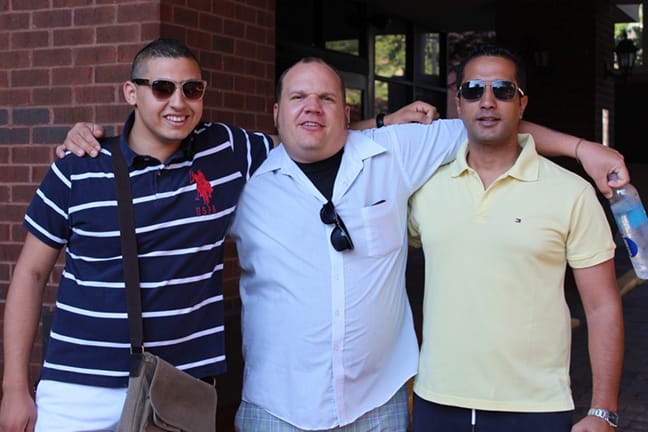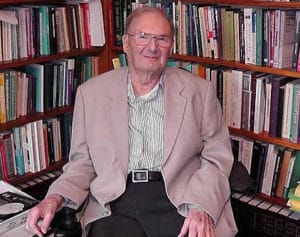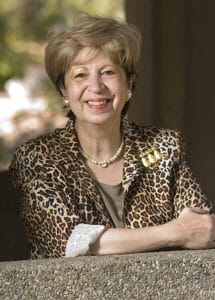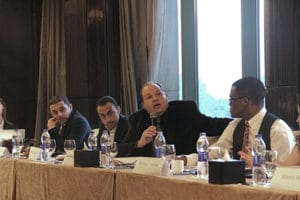Jeremiah Bowden: Journeys in Peace and Understanding

Just over a decade ago, Jeremiah Bowden was living his rock-star dreams.
The Midwest native was busy establishing himself as a musician, serving as the frontman for different alternative rock bands. Bowden was enjoying life on the road, performing with one of his bands, Silik, across the Midwest and West Coast. Eventually he was spending time in the studio, recording tracks for a full-length album. Bowden was serious about music.
But 9/11 changed all that.
Less than 24 hours after Bowden’s son was born, terrorists attacked the World Trade Center towers. It came to be a moment of realization. While Bowden continued to pursue his music for the next couple of years—at one point Silik traveled to West Hollywood for a show at The Roxy—he nevertheless recognized that the time to pursue a new direction was soon approaching.
“After 9/11, it was an awakening experience,” he said. “I needed to really do something serious with my life.”
After pursuing religious studies and theology at Wisconsin universities, Bowden found his new direction: promoting peace and understanding between different faith and cultural communities. It was this path of study that drew him to CGU, where he is currently a PhD student in the university’s new interdisciplinary degree program in secular studies and religion offered through the School of Arts & Humanities.
“I started on this path of study because I want to build bridges between Muslims, Christians, and secularists,” Bowden said.
To that end, a prestigious international fellowship—involving work and study at various Egyptian and American cities—has recently accelerated his focus on overcoming challenges between Western and Eastern societies.
A New “Dream”
But in the late 1990s and early 2000s, Bowden was more focused on singing than scholarship.
Born in a small, largely homogenous farming community of about 500 people in central Wisconsin, Bowden graduated from high school in 1998.
“When it came to electives, we had shop, we had drama, and Spanish,” he said. “Those were pretty much the choices we had.”
Bowden zeroed in on music, spending several years “chasing his dreams.”
“I wanted to be a rock star,” he said.
After serving as the vocalist for the band F5, the then-twentysomething musician joined Silik. The band performed at clubs and venues across Wisconsin, Colorado, New Mexico, and Iowa. Silik also recorded tracks for an album—released in 2012—entitled Remains of the Past.
But Bowden’s melodic pursuits soon took a different turn.
First came the birth of his son, Gabriel, on September 10, 2001. Becoming a father was enough of a prompt to start rethinking his life, Bowden said.
Then—less than a day later—came the attacks on New York City and the Pentagon.
“It was at that point that I made a choice and a promise to my son and to myself: I would do whatever I could to have a positive impact, to make sure that something like this doesn’t happen again in the future,” Bowden said.
He eventually chose higher education as the means to keep that promise.
Faith Traditions
At first, Bowden considered tapping into his musical background. He began studying at the University of Wisconsin, harboring plans to become a choir teacher. But Bowden began taking survey courses in religious studies, psychology, and philosophy.
“It really opened me up to this whole sphere of knowledge that I had never had any access to,” he said.
It was during an introduction to a Western religions class when Bowden began to take a deeper look into Islam, Judaism, and Christianity, and the similarities and differences between the faith traditions.
Bowden was particularly interested in how non-Christian faiths were portrayed in the media.
“You don’t see any Muslim peace builders ever brought to the fore,” he said. “I found that troubling.”
Bowden went on to receive a bachelor’s degree in philosophy and religious studies. Later, he earned a master’s in theology from Marquette University, a Catholic university in Wisconsin. There, he delved into the concept of religious pluralism, the idea that different belief systems can co-exist and should be considered equally valid.
Bowden studied what some of the foremost thinkers had written on the subject.
“Theologians from Christian and Muslim perspectives were asking the same question: Are people of different faiths ‘saved’?” Bowden said.
Islamic Scholarship
Bowden read The Islamic Roots of Democratic Pluralism by Abdulaziz Sachedina, an Islamic studies professor at George Mason University in Virginia who focuses on interfaith and intrafaith relations. He also studied the writings of Seyyed Hossein Nasr, a professor of Islamic studies at The George Washington University in Washington, DC, who has written about Islamic traditions and their relation to the West.
He also immersed himself in the works of scholars such as Paul Tillich, an influential theologian who contributed a philosophical perspective and Christian frame of reference to religious pluralism.

Bowden also studied John Hick, who held the position of Danforth Professor of the Philosophy of Religion at CGU from 1979 to 1992. Hick is credited with pushing for interreligious dialogue among Jewish, Christian, and Muslim practitioners and showcasing religious pluralism as a robust field of study. Hick’s An Interpretation of Religion: Human Responses to the Transcendent resonated with Bowden.
“It was really influential in drawing me to this area,” he said.
In 2010, Bowden enrolled at CGU.
Bridging the Gap
He said his prior degrees made him feel confident—and ready—to engage with Christian and non-Christian communities. But he began to expand the scope of his research.
At CGU, Bowden has been studying secular communities—a growing demographic in American society.
“Just as I’m trying to bridge the gap between Christians and Muslims, I also want to bridge the gap between secularists and believers, whether Muslim believers, Christian believers, or Jewish believers,” he said.
Bowden later enrolled in the “Religion and Power Politics in the Middle East” class taught by Ambassador Sallama Shaker, the former Assistant Minister of Foreign Affairs of Egypt who is also a professor of Middle East and Islamic studies at CGU.
He called the class a very “enlightening” experience and highly regards Shaker for her role as a mentor and advocate.

“I think there comes a time in each of our lives when we begin to question some of the major life decisions we have made,” Bowden said. “Shortly before working with Dr. Shaker I was seriously reconsidering my decision to pursue a PhD. I am eternally grateful for the opportunity to work with Dr. Shaker as her encouragement has had a tremendous impact on my professional and personal life and has reinvigorated my desire to excel in my studies.”
Bowden’s scholarship and ambitious drive—he has served as the assistant to the director of the Center for Global Peacebuilding at Claremont Lincoln University and as a member of the editorial board for the Claremont Journal of Religion—equally made an impression on Shaker.
She recommended Bowden for the Shafik Gabr Fellowship.
The Art of Dialogue
The fellowship is part of East-West: The Art of Dialogue, an initiative of the Shafik Gabr Foundation. Shafik Gabr, an internationally recognized business leader, philanthropist, and art collector from Egypt, established the foundation. He is the chairman and managing director of the ARTOC Group for Investment & Development, an investment holding company with subsidiaries in the automotive, consumer products, publishing, real estate, construction, and other industries.
The foundation was based on the idea that non-government organizations can prompt change in the world and that individual people must play a role in fostering peace and improving global conditions.
The fellowship, which launched in 2013, selects emerging leaders from between the ages 24-35 in the areas of art, science, legislation, and social and business entrepreneurship. It is a four-week program combining study and work in both American and Egyptian cities.
Participants, known as Gabr Fellows, meet prominent figures in politics, business, art, law, and media to discuss and learn about the challenges facing their societies and the obstacles to international cooperation.
With Shaker’s recommendation, Bowden was selected as one of the fellows. He and the other fellows traveled to Cairo, Giza, Alexandria, Luxor, and Aswan, all in Egypt, in May 2014. For the United States leg, the fellows visited Atlanta, New York, New Jersey, and Washington, DC, the following month.
Influential Leaders
The Gabr fellows were a promising and diverse group. In addition to Bowden, they included Michael Goff, an assistant professor of mathematics at Vanderbilt University; Nathan Thomas, an educational programs associate at the William J. Clinton Foundation; and Sarah Derdowski, director of operations for the Global Energy Management Program at the University of Colorado Denver Business School.

The Egyptian fellows included Nancy Habib, editorial secretary for the Al Tahrir newspaper; Yasmin Galal, a social activist and media producer; and Zeyad Elkelani, a political science teaching assistant at Cairo University.
One of the fellows’ many highlights, Bowden said, was the opportunity to meet and speak with scholars he admired as well as hear from influential leaders. For example, he attended a lecture (“Update on Israeli Palestinian Negotiation Failure or Possibility) by Dr. Shibley Telhami, director of the Anwar El-Sadat Chair for Peace and Development at the University of Maryland. He heard Egyptian Minister of Foreign Affairs Sameh Shoukry deliver his “Egyptian Diplomacy in the 21st Century” presentation. Bowden also participated in a roundtable discussion with General and Deputy Minister of Defense Mohamed El Assar and General and Assistant to the Minister of Defense Mohamed El Keshky.
Fellows also met with representatives of then-Egyptian President-elect Abdel Fattah el-Sisi.
“It was nice to be able to sit down with these folks and engage with them,” he said.
Just as significant, however, were the opportunities fellows had to discuss the topics and issues amongst each other, Bowden added.
“So, not only are we getting that top-down kind of information, but we’re also getting that horizontal information from our fellows,” he said. “It was nice to have both.”
For the cultural component of the fellowship, they visited the Pyramids of Giza, the Library of Alexandria, and the Karnak and Luxor temples.
In the United States, fellows took part in meetings at the White House, the Pentagon, the State Department, USAID, the Department of Homeland Security, the United Nations, Google, Fox News, CNN, and The Huffington Post. They also visited sites such as Carnegie Hall, the 9/11 Memorial, and Ebenezer Baptist Church, where Martin Luther King Jr. preached.
Breaking Down Barriers
As a requirement of the fellowship, Bowden and his colleagues were responsible for developing a project. Each project had to build understanding between East and West, make use of each fellow’s area of expertise, and be sustainable. The Gabr Foundation covered half the cost of each approved project’s start-up cost.
Bowden teamed up with Elkelani and Derdowski for one such project. The team envisioned a center that would partner with an Egyptian university and an American university and offer a joint degree program that took a multidisciplinary approach.
The project was approved and the Center for Global Citizenship and Dialogue was established earlier this year. It is designed to further the Gabr Foundation’s efforts to spur cross-cultural exchange.
The center recently launched a quarterly webinar series that addressed the issue of effective bridge building. In December the center will host another webinar that will examine the role of religious extremism in world politics.
By the same token, Bowden’s educational pursuits are also advancing.
He is currently Shaker’s teaching assistant in a new course she is currently teaching entitled “Politics, Modernization, Development: The Muslim World in Comparative Perspectives.”
“Jeremiah will be able to be instrumental in bridging between both worlds from his experience in the field,” she said.
Bowden expects to complete his PhD program and graduate by 2015.
He plans to continue his peace-building efforts, either as a university professor or director for a center sharing his vision of dialogue and inclusivity. To that end, he cites Dr. King’s quote: “We must learn to live together as brothers or perish together as fools.”
“I think there’s a lot of truth to that,” Bowden said. “If there’s going to be hope in the future, we need to move forward and break down these barriers that exist.”